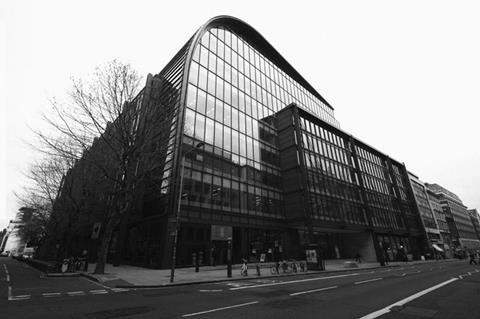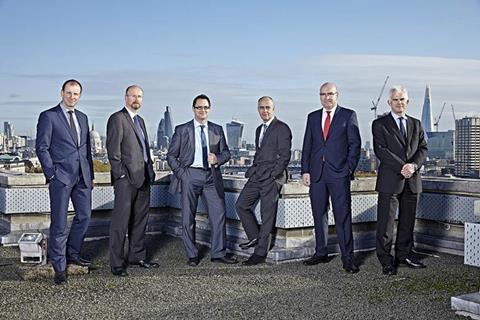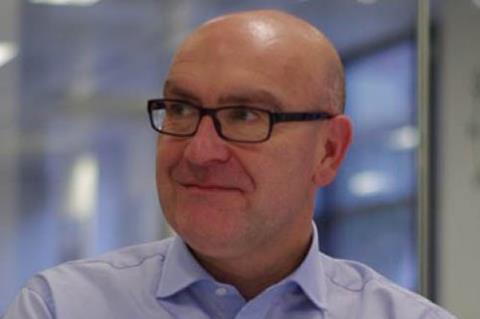In the week T&T bought out Alinea, here is a compilation of key milestones in the cost consultant’s short but eventful life
This week Building broke a story that shocked the London QS market: Alinea – born just 10 years ago in the aftermath of Aecom’s takeover of Davis Langdon - had itself sold out to a corporate giant, this time to T&T.
The deal, rumoured to be worth £25m-£35m, means this once-independent cost consultant known for working on London towers such as 22 Bishopsgate, will be rebranded as Turner & Townsend Alinea.
For T&T the acquisition means access to top-end clients in the City of London, for Alinea it means its expansion plans have been accelerated by years, global opportunities and of course the equity partners will receive a financial windfall.
>> Also read: Why Alinea turned its back on independence and signed up with T&T
Here we have compiled some extracts from coverage in the Building archive, going back to the very beginning when some staff at the recently acquired Davis Langdon were experiencing some friction at their new owner, the global firm Aecom.
11 January 2013
Aecom/Davis Langdon: Culture shock

Aecom bought Davis Langdon in 2010. Building talks to those who left, those who stayed, and the firm’s clients on what has changed - and what the future holds
When global engineering giant Aecom bought UK consultancy, Davis Langdon, in 2010, everyone knew that a big change was in store for what is one of the most historic names in UK construction consultancy. But the extent of Davis Langdon’s transformation over a little over two years - both commercially and culturally - has taken many by surprise. And few could have predicted the exodus of top talent that has hit the business.
An analysis conducted by Building reveals over 40% of the firm’s 74 former equity partners have left since the partnership voted through the Aecom takeover in July 2010. In addition, at least 30 former non-equity partners have also left over the period.
Separately, Aecom disclosed in November that it was writing down £200m after a fall in the estimated value of its Management Support Services business and a series of European acquisitions. Europe chief executive Steve Morriss at the time accepted that at least part of this related to its £204m purchase of Davis Langdon. This writedown pushed Aecom £36.9m into the red for the financial year to 30 September 2012.
Davis Langdon’s management - both internally and at the wider Aecom business – admit the UK consultant has had its setbacks since the takeover. But they are adamant the firm has changed overall for the better - particularly in terms of its increased scale and its access to the broader capabilities of Aecom. “We’re hugely proud of our business and what it’s become,” says Peter Flint, Aecom’s buildings + places lead in Europe, the Middle East and Africa, and a former Davis Langdon equity partner. “We’re not the same as we were but we are as good as we were and in some ways we are better.”
…
>> Click here for the full article which also included a list of former Davis Langdon partners and where they went next
10 May 2013
Former EC Harris and DL stars launch consultant
Six former partners of EC Harris and Davis Langdon have launched a new consultant, Alinea Consulting.
Davis Langdon’s former head of commercial Paul Allen, former head of tall buildings Steve Watts, former head of offices Iain Parker and former head of retail Paul Zuccherelli have joined forces with EC Harris’ former head of commercial Richard Taylor and former partner in the London team Mark Lacey.
In a statement the six founders said they will focus on construction cost consultancy and their aim is to “be the best”.
The statement emphasised Alinea is “totally independent”. It is fully-funded by the six founding partners, who each have equal shares in the business.
All six founders worked together at Davis Langdon for many years before Taylor and Lacey jumped ship to EC Harris within six months of Davis Langdon being taken over by US-based construction group Aecom.
Alinea is likely to compete with more established rivals, particularly in the London market.
…
>> Click here for the full news story
13 December 2013
Interview: Alinea

The six co-founders of Alinea are clambering on to the roof of London’s Adelphi building for a Building photoshoot. They ascend a service ladder to the highest part of the building overlooking central London - a skyline the six of them have, more than any other group of cost consultants, helped to shape over the past 25 years.
Between them, (as pictured, left to right) Steve Watts, Paul Zuccherelli, Iain Parker, Richard Taylor, Mark Lacey and Paul Allen have over 150 years of experience, gained at two of the UK’s best -known QSs, Davis Langdon and EC Harris. They have worked on 100 million ft2 of projects, primarily in the London commercial sector, including icons such as the Shard and the Leadenhall Building. Then, seven months ago, they rocked the tight-knit London scene by quitting plum jobs heading up 100-strong commercial teams at DL and EC Harris to go it alone.
It is a bitterly cold November morning, but the Alinea six are boisterous. “Can you see any of your buildings from up here, Mark? They’re all a bit small, aren’t they?” quips Watts, one of the world’s foremost tall buildings experts and board member of the Council on Tall Buildings and Urban Habitat. “Have they started knocking down your buildings yet, Paul?” jokes Parker to Allen, the oldest member of the team.
It’s no wonder they’re in high spirits. We are standing on top of their first collective project - Alinea is refurbishing 220,000ft2 of the art deco Adelphi for property investor Blackstone, a commission Alinea landed within two weeks of launching - and they’ve gone from strength to strength from here, picking up 6 million ft2 of schemes worth over £1bn in construction value. They are now 22-people strong, will be 28 in February, and say they’re outperforming their business plan. They expect staff to number 100 within five years. They’re also clearly having fun.
But they still have to prove they can make good on their ambition - delivering the biggest projects in London and the UK, the next Shard or Leadenhall. The signs are good, with major schemes including £1.5bn mixed-use Silvertown Quays in east London for Chelsfield and a proposed tower scheme on Leadenhall Street in the City for Mitsubishi Estate. But other clients will need persuading that they can take on the kinds of projects they became accustomed to at Davis Langdon and EC Harris, without their previous employers’ scale, depth of expertise and financial muscle. Some industry figures privately ask what differentiates them from the host of other post-recession start-ups, many of which are now quite well established.
Interviewing all six co-founders wouldn’t exactly be an even match, so Alinea agree to put up two - Taylor and Parker, who lead on business development and people respectively. Nonetheless, they’re keen to stress the firm is a business led by equal partners. An engaging double act, Taylor is never far from a wisecrack, while Parker has a more philosophical bent. Both are passionate about their venture and argue persuasively that Alinea is a match for any competitor and any project, of any scale.
…
>> Click here to read the full interview
18 May 2018
Going it alone
Britain’s QS sector changed dramatically in the wake of the credit crunch, with the foreign takeover of big-name firms prompting those of an entrepreneurial bent to start up on their own. Have these challenger firms become the new establishment, or are they vulnerable to a new downturn?
Cost consultant Alinea, believe it or not, is five years old this month. The business, which was started by a group of former Davis Langdon and EC Harris partners, was one of a number born out of a torrent of change that struck UK consultants during the credit crunch.
This wave swept up the most venerable consulting names in the UK industry. Both Davis Langdon and EC Harris were bought up by foreign engineering giants – Aecom and Arcadis respectively – changing them irrevocably. As the effects of the recession continued to be felt, Currie & Brown and Sweett Group met a similar fate, both mopped up by Dar Group.
Former Davis Langdon (DL) partner Iain Parker, one of the founders of Alinea, says: “The landscape for cost consultants changed dramatically. We saw a once-in-a-generation opportunity to replace these household name QSs that were being bought up.”
Parker was not alone in this view, with other senior staff leaving to set up challenger firms such as Core Five, Cast and Exigere, among many more. Meanwhile those mid-tier businesses that managed to remain independent during the recession – the likes of Gardiner & Theobald (G&T), Turner & Townsend and Gleeds – have also been working hard to take advantage of the turmoil.
So now, with the tempest of change long past, how much long-term impact has the storm of 2010-13 had on the landscape for UK QS and project management firms? Have the challenger firms succeeded in becoming the new establishment?
…
>> Click here to read the full article here
28 May 2021
In Business: Alinea warns of aggressive bids in a slowing commercial market
Cost consultant’s Mark Lacey says contractors looking to replenish covid-hit order books are cutting prices

“There’s some very aggressive bidding going on at the moment,” says Alinea partner Mark Lacey.
The firm, which is still best known as a cost consultant on London commercial despite plans to diversify into other areas, says the pandemic has put the squeeze on what contractors, particularly the specialists, can bid for in the future. In short, lots are chasing not much.
The London office market is around 40% of Alinea’s £15.2m income. Lacey says the market is resilient but admits the number of starts is down – although the firm has been deluged with inquiries about feasibility studies from office developers.
“[Offices] are moving forward but progress is slow,” he added with work in the market only expected to tick up again in the autumn in part thanks to the capital’s status as a global city.


























No comments yet